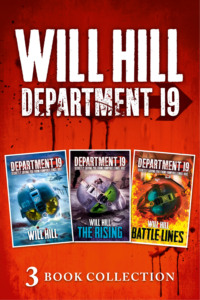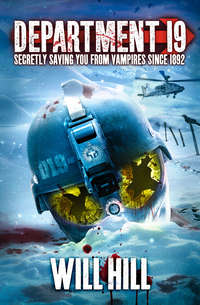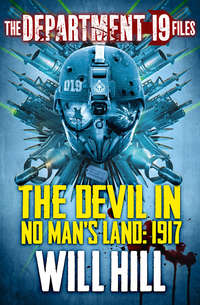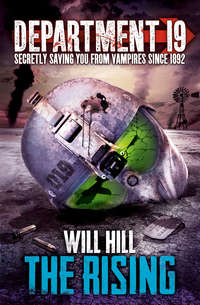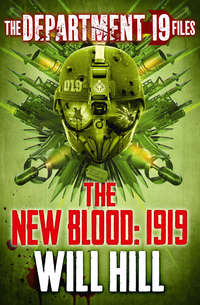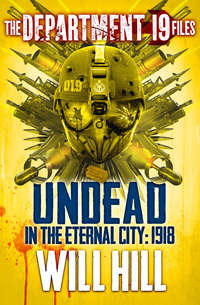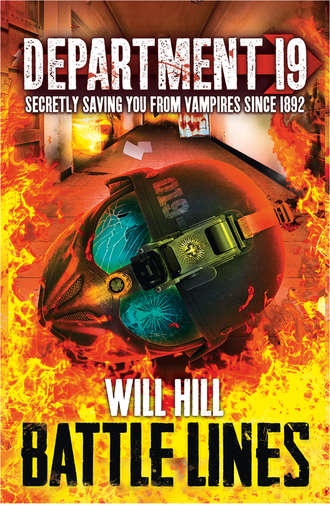
Полная версия
Battle Lines

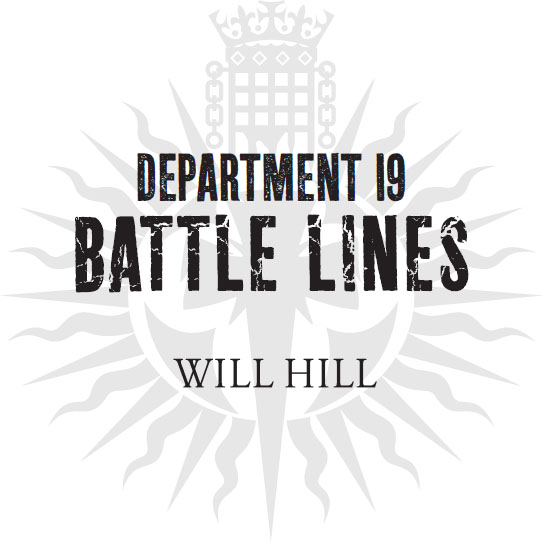

For Sarah,
who knew what writers were like, but managed to look past it
The earth had a single light afar,
A flickering, human pathetic light,
That was maintained against the night,
It seemed to me, by the people there,
With a Godforsaken brute despair.
Robert Frost
We seem to be drifting into unknown places and unknown ways; into a whole world of dark and dreadful things.
Jonathan Harker
Table of Contents
Title Page
Dedication
Epigraph
Memorandum
Prologue
52 Days Till Zero Hour
1. The Next Generation
2. Lazarus Revamped
3. Slow News Day
4. The Desert Should Be No Place for a Vampire
5. Everything Heals, in Time
6. Civilised Men
7. Sink or Swim
8. The Lost Harker
9. The Shock of the New
10. In Conversation
11. Time to Go Home
12. Ready to Roll
13. Social Networking
14. Girls vs Boys
51 Days Till Zero Hour
15. One of Our Own
16. Classified Means Classified
17. Old Scores
18. The Most Important Meal of the Day
19. The War on Drugs, Part One
20. The Sleep of The Just
21. The War on Drugs, Part Two
22. On The Trail of the Dead
23. Truth or Consequences
24. The War on Drugs, Part Three
25. From Beyond the Grave
26. Too Close to Home
27. Dormant for Too Long
28. Where It Hurts
29. Drowning Out
30. Preliminary Conclusions
31. From Ancient Grudge Break to New Mutiny
50 Days Till Zero Hour
32. Closing the Net
33. Playing with Fire
34. The Sum of Our Parts
35. Going Underground
36. Sin City
37. By a Thread
38. Joining Up the Dots
39. Prime Suspect
40. Paved with Good Intentions
41. Undercurrents
42. Fathers4Truth
49 Days Till Zero Hour
43. The Dark Horizon
44. Three Musketeers
45. Final Edition
46. It Never Rains…
47. Time Waits for No Man
48. Behind the Curtain
49. Pieces of the Puzzle
50. Deadline
51. … It Pours
52. Headlong
53. Leaving on a Jet Plane
54. Guilty Parties
55. Hold the Front Page
56. We Take Care of Our Own
57. Hot Off the Press
58. After the Horse Has Bolted
59. What Might Have Been Lost
60. Homecoming
Two Days Later
61. Post-Mortem
Epilogue: Three Farewells
Epilogue: Two Prisoners
46 Days Till Zero Hour
Acknowledgements
Copyright
About the Publisher
MEMORANDUM
From: Office of the Director of the Joint Intelligence Committee
Subject: Revised classifications of the British governmental departments
Security: TOP SECRET
DEPARTMENT 1 Office of the Prime Minister DEPARTMENT 2 Cabinet Office DEPARTMENT 3 Home Office DEPARTMENT 4 Foreign and Commonwealth Office DEPARTMENT 5 Ministry of Defence DEPARTMENT 6 British Army DEPARTMENT 7 Royal Navy DEPARTMENT 8 Her Majesty’s Diplomatic Service DEPARTMENT 9 Her Majesty’s Treasury DEPARTMENT 10 Department for Transport DEPARTMENT 11 Attorney General’s Office DEPARTMENT 12 Ministry of Justice DEPARTMENT 13 Military Intelligence, Section 5 (MI5) DEPARTMENT 14 Secret Intelligence Service (SIS) DEPARTMENT 15 Royal Air Force DEPARTMENT 16 Northern Ireland Office DEPARTMENT 17 Scotland Office DEPARTMENT 18 Wales Office DEPARTMENT 19 CLASSIFIED DEPARTMENT 20 Territorial Police Forces DEPARTMENT 21 Department of Health DEPARTMENT 22 Government Communication Headquarters (GCHQ) DEPARTMENT 23 Joint Intelligence Committee (JIC)PROLOGUE
CROWTHORNE, BERKSHIRE
In the village of Crowthorne is an alarm.
A direct copy of a World War Two air-raid siren, it is bright red, and sits atop a pole two metres above the ground.
The alarm is connected by an underground network of wires to Broadmoor Hospital, the sprawling estate of red-brick buildings that sits above the village, and which is home to almost three hundred of the United Kingdom’s most dangerous, damaged citizens.
It is designed to alert anyone within a twenty-five-mile radius to an escape from the hospital, and has been sounded only five times in earnest in more than fifty years.
Ben Dawson had been asleep for about forty-five minutes when the siren burst into life. He jerked up from a dream about sleep, the kind of long, deep, uninterrupted sleep that had been impossible in the six weeks since Isla was born, and felt his wife raise her head slowly from her pillow.
“The baby OK?” she slurred.
“It’s not Isla,” he replied. “It’s the siren.”
“Siren?”
“The bloody Broadmoor siren,” he snapped. It was deafening, a two-tone scream that made his chest tighten with anger.
“What time is it?” asked Maggie, forcing her eyes open and looking at him.
Ben flicked on his bedside lamp, wincing as the light hit his eyes, and checked the clock.
“Quarter to four,” he groaned.
Not fair, he thought. It’s just not fair.
Then he heard a second sound, in between the peals of the alarm; a high, determined crying from the room above their bedroom. Ben swore and swung his legs out from under the duvet.
“Stay there,” said Maggie, pushing herself to the edge of the bed. “It’s my turn.”
Ben slid his feet into his trainers and pulled a jumper over his head. “You see to Isla. I’m going outside, see if anyone else is awake.”
“OK,” said Maggie, stumbling through the bedroom door. She was barely awake, moving with the robotic lurch of new parents everywhere. Ben heard her footsteps on the stairs, heard her begin to gently shush their daughter.
Ben felt no fear at the sound of the siren. He had been up to the hospital several times, had seen the electric fences and the gateposts and the sturdy buildings themselves, and was not the slightest bit concerned about the possibility of a breakout. There had been several, over the years; the escape of John Straffen in 1952, who had climbed over the wall while on cleaning duties in the yard and murdered a young girl from Farley Hill, was the reason the siren system had been built. But the last time anyone had made it out had been almost twenty years ago, and security had been increased and expanded since then. Instead, as he stomped down the stairs towards the front door, knowing the baby was already awake so it didn’t matter, what Ben was mainly feeling was frustration.
The last six weeks had been nothing like the parenting books had suggested, or as their friends had described. He had expected to be tired, expected to be grumpy and stressed, but nothing had prepared him for how he actually felt.
He was utterly, physically, exhausted.
Isla was beautiful, and he felt things he had never felt before when he looked at her; that part was exactly as advertised, he had been glad to realise. But she cried, loudly and endlessly. He and Maggie took it in turns to go and check on her, to warm bottles or burp her or just rock her in their arms. Eventually, her eyes would flutter closed, and they would place her back in her cot, and creep back to their own bed. If they were lucky, they might get two hours of uninterrupted sleep before the crying began again.
Ben shoved open the front door. The night air was warm and still, and the siren was much louder outside. He walked out on to the narrow cobbled street and saw lights on in the majority of his neighbours’ homes. As he lit a cigarette from the pack he kept for emergencies, like when he had been woken up for the third time before it was even four o’clock, doors began to open and pale figures in pyjamas and dressing gowns began to appear.
“What on earth is going on?” demanded one of the figures, a large, broad man with a huge, bald dome of a head that gleamed in the light. “Why doesn’t someone turn it off?”
Charlie Walsh lived next door to Ben and Maggie. Ben glanced at him as he made his way over, then returned his gaze to the hill above the village. The hulking shape of the hospital was visible as a distant black outline in the centre of a faint yellow glow.
“I don’t think you can,” Ben replied. “I’m pretty sure you can only turn it off at the hospital.”
“Then maybe someone should go up there and see what’s happening?”
“Maybe someone should,” replied Ben.
“All right then,” said Charlie. “I’ll come with you.”
Ben stared at his neighbour. He wanted nothing more than to go back upstairs, wrap his pillow round his head, and wait for the terrible ringing to stop. But that was now no longer an option.
“Fine,” he snapped, and strode back into his house to grab the car keys from the table in the hall.
A minute later the two men were speeding out of what passed for central Crowthorne in Ben’s silver Range Rover, heading up the hill towards the hospital.
Behind the desk in Crowthorne’s tiny police station, Andy Myers was trying to hear the voice on the other end of the phone over the deafening howl of the siren.
Crowthorne police station was rated Tier 1 by the Thames Valley Police, which meant that its front desk was staffed entirely by volunteers. There were twelve of them, mostly retirees, who took turns to field the small number of enquiries that came in from local residents – everything from minor incidents of graffiti and vandalism, to requests for advice on traffic accidents. The station was not manned overnight, but one of the volunteers was always on call. Tonight, Andy Myers had drawn the short straw.
He had dragged himself from the warmth of his bed when the siren burst into life, grumbling, stretching, and feeling every single one of his sixty-eight years. The space in the bed beside him was cold and empty; his wife, Glenda, had occupied it for more than thirty years before cancer had claimed her the previous summer. Since then Andy, who had spent his working years in the brokerage houses of the City of London, had been looking for ways to fill the hole in his life that she had left behind. Volunteering at the police station was just one of the ways he tried to do so; he was also on the board of the local Rotary Club, an active member of the Village Green Association and secretary of Crowthorne Cricket Club.
He dressed quickly and made the five-minute walk to the station. He did not hurry; he was no more concerned about the possibility of an escape than Ben Dawson was. But there were protocols in the event of the siren sounding, and Andy Myers was a great believer in protocol.
He walked into the station’s car park, wincing at the bellowing noise from the siren that stood behind the building. It was little more than a converted house, sitting at the end of a row of terraces. He unlocked the door and went inside, flopped down into the worn leather chair behind the desk, reached for the phone, and dialled a number.
The official response to a suspected escape from Broadmoor was twofold: it required all local schools to keep children inside and under direct supervision of staff until parents could arrive to take them home, and it called for the establishment of a ring of roadblocks at a ten-mile radius from the hospital. Crowthorne station had a single police car, an ageing Ford Focus that was sitting outside, so Andy’s only duty was to call the Major Incident Response Team in Reading and request instructions.
“Say again, sir?” he shouted, over the din of the siren. “You want me to do what?”
“Drive up there,” yelled the voice on the other end of the phone. “Go and see what the hell is going on. We’re sending units out to set up the roadblocks, but we can call them back if this is a false alarm.”
“What are they saying up on the hill?” shouted Andy.
“No answer,” replied the officer. “We think their system’s crashed, or gone daft, or something. Get up there, talk to the duty nurse, then radio in and tell us what’s happening. Clear?”
“Yes, sir,” shouted Andy Myers, and hung up the phone.
He swore heartily, the way that had always made Glenda widen her eyes at him in warning, and grabbed the Ford’s keys from the hook above the desk. He locked up the station, climbed into the car, and pulled out of the car park. As he reached the edge of Crowthorne, he flicked on the lights and the siren, even though it would be impossible to hear over the blare of the alarms. Then he pressed down on the accelerator and pointed the little Ford along the same road that Ben Dawson’s Range Rover had taken, less than five minutes earlier.
Charlie Walsh fiddled with the radio as Ben drove, flicking from one station to the next until Ben gave him a sharp sideways look and he turned it off. They drove on in silence, climbing the wide, shallow hill that dominated the countryside for miles around, until the Range Rover sped smoothly round the final bend and Broadmoor lay before them.
It had been opened in 1863 as Broadmoor Criminal Lunatic Asylum, terminology long since considered offensive. In the modern era it had been expanded to the size of a small village, a sprawl of low concrete buildings and trailers, of metal sheds and covered walkways. But the main buildings, where the inmates were housed and treated, were the same now as they had been more than a hundred and fifty years earlier: squat, Gothic structures of orange-red brick and grey tiled roofs that revealed their original purpose. The buildings looked, in every way, like those of a prison.
Ben slowed the car as they approached the outer fence. The tall metal mesh, easily seven metres high, topped with razor wire and electrified along its entire length, marked the edge of the exclusion zone that surrounded the hospital; inside it, tall brick walls, security patrols, deadlock doors and barred windows were designed to make sure that no inmate got anywhere near the fence. If they did, there was a sharp, unpleasant shock waiting for them.
The gate in the middle of the fence was standing open.
It ran on wheels, dividing in the middle, powered by an automated system operated from the security control room. There was a small box beside the gate containing a telephone, but it was rarely needed; very few people arrived at Broadmoor unannounced.
Ben pointed the Range Rover between the open gates and drove slowly forward.
“I don’t like this,” said Charlie Walsh. “We should go back. Let’s let the police deal with it.”
“We’re here now,” said Ben. “We might as well take a look.”
Beyond the electrical fence the road rose slightly to the main entrance of the hospital. The gatehouse resembled a medieval keep: two towers flanking a vast black gate, above which was set a severe-looking clock, fashioned in black and gold. The outer buildings of the hospital extended away from the gatehouse on both sides, merging into the looming ward buildings and the towering inner wall. The gatehouse gave the impression of being impregnable.
Unless the gate was open, as it was now.
Ben drove slowly through it, unease crawling in his stomach. The gates to Broadmoor were never open, and even if there had been a malfunction in the electric fence, they should never have been able to get this close to the gatehouse without being intercepted. That both gates should be standing open was unthinkable. And Ben noticed something else. He pressed the button on the door handle that lowered his window, felt the mild night air flood into the car, and listened.
The siren screamed into the car, rising and falling. But beyond it, in the gaps, there was no sound.
The hospital was usually a hive of activity and noise, even this early in the morning. There should have been the sounds of footsteps, the barking of the security guards’ dogs, the chatter of the nightshift employees.
But there was nothing.
“What are you listening to?” shouted Charlie Walsh, making himself heard over the alarm. “What can you hear?”
“Nothing,” shouted Ben. “Nothing at all.”
He wound the window back up and gently pressed the accelerator. The big car crept through the gate; beyond it were two small guard posts, plastic boxes like the kind that stand at the entrance to toll roads. He peered into the one on his side as the car rolled slowly past. It was empty. There was no sign of movement, although there was a dark shape on the rear wall, like a tin of paint had been thrown against it.
“What about your side?” he asked. “Anyone there?”
“No one,” replied Charlie and, for the first time, Ben heard the fear in his neighbour’s voice. “There’s no one here, Ben. Where the hell are they all?”
“I don’t know.”
They drove silently into the courtyard beyond the gatehouse. Modern administrative units stood on either side, but rising in front of them was the original Broadmoor building, a towering, imposing structure of dark orange bricks. There was a wide set of steps leading up to an ornate front door, and it was on these steps that Ben saw something out of place.
He stamped on the brakes of the Range Rover, throwing Charlie Walsh forward against his seat belt, causing him to yell out in alarm.
“What the hell—”
“Quiet,” interrupted Ben. He flicked the car’s headlights to full beam, illuminating the courtyard.
Lying on the stone steps was a man wearing a white hospital gown, much of which was soaked crimson.
“Oh God,” whispered Charlie. “Oh God, Ben, I don’t want to be here any more. Let’s get out of here.”
Ben didn’t reply. He was leaning towards the windscreen, craning his neck upwards, awfully sure of what he was going to see. He heard his muscles creak, then saw it.
On the fourth floor, directly above where the man was lying, one of the windows was open to the night, its reinforced glass missing.
“He jumped,” whispered Ben. “You can see the broken window. He jumped out.”
Walsh leant forward, but his shoulders and neck were too wide to see where Ben was pointing. He slumped back in his seat, breathing hard.
“He’s dead, Ben,” he said, his voice wavering. “There’s nothing we can do for him. We go home and we call the police and they can send an ambulance up here. Please, Ben, let’s go. Please.”
“Why is he just lying there?” wondered Ben aloud. “Why didn’t anyone try to help him? Where are all the nurses?”
“I don’t know!” screeched Charlie. “I want to go home, Ben, I want to go right now!”
Ben looked at his neighbour. The man appeared to be on the verge of a panic attack, his chest heaving, his eyes wide and bulging. And he was right, there was nothing they could do for the man: the puddle of blood beneath him was shockingly large. But everything about the hospital felt wrong to Ben. It wasn’t just the open gates; it was too quiet, too empty, and now one of its patients was lying dead in the courtyard and no one seemed to have even noticed.
He unfastened his seat belt, reached out, and opened the door beside him.
Charlie let out a yelp. “What are you doing?” he shouted, over the deafening siren.
Ben ignored him. He stepped out of the car in something close to a trance, his mind racing with what he was seeing all around him, turning it over and over like a puzzle whose solution was dancing just out of reach. Distantly, he heard the passenger door open and Charlie Walsh step nervously on to the cobblestones.
“Get back in the car, Ben,” he yelled. “Please.”
The pleading in the man’s voice brought Ben to his senses and he shook his head, as if to clear it.
“OK,” he shouted, and saw Charlie Walsh’s face crumple with relief. “Sorry, mate. Let’s go.”
He climbed back into the driver’s seat and was pulling the door shut when the dead body stood up and looked at them.
It was a man in his late twenties or early thirties. His gown looked as though it had been dipped in dark red paint, and his left arm was pointing away from his body at an unnatural angle, but his face wore a wide, hungry smile and his eyes glowed the colour of lava.
Charlie Walsh let out a high, trembling scream, and pressed his hands against the dashboard as though trying to push himself backwards, away from the nightmare thing before him. Ben just stared, his eyes bulging, unable to comprehend what he was seeing. Then the blood-soaked figure ran forward, leapt on to the bonnet of the Range Rover, and smashed its fist through the glass of the windscreen.
Ben’s paralysis broke as Walsh screamed again. The noise of the siren burst into the car through the broken windscreen, deafening them both. The man with the red eyes shoved his arm through the glass, tearing his skin to ribbons; blood splashed into the air as the man’s fingers slid across Ben’s throat, then lunged for Walsh’s face. The man was yelling so loudly that he was audible over the din of the alarm, shouting words that were unintelligible to Ben’s ears, his mouth working furiously, spit and blood pattering down on to the glass as he fought to reach the two men inside the car.


